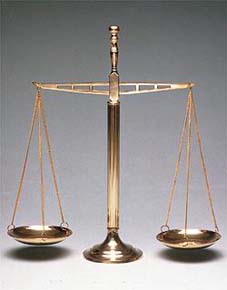 I am not about to tackle court rulings or to criticise them. The judicial authority warrants all due respect and reverence; and there are legal, well established routes to follow if one is to question or contest a ruling. I am just about to comment on a few rulings which appear revolutionary in concept but, even though they may give rise to comfortable public sentiment, they leave behind queries about their legal backing and their compliance with prevalent legislation.
I am not about to tackle court rulings or to criticise them. The judicial authority warrants all due respect and reverence; and there are legal, well established routes to follow if one is to question or contest a ruling. I am just about to comment on a few rulings which appear revolutionary in concept but, even though they may give rise to comfortable public sentiment, they leave behind queries about their legal backing and their compliance with prevalent legislation.
The law in the hands of the judges
Youseef Sidhom
Opinion
00:05
Sunday ,09 May 2010

We are all familiar with the climate that governs the building of places of worship and, in case of churches, the oppressive security and political preconditions that have to be met before embarking on the construction procedures. We should not forget especially that no new church can ever be built unless a presidential decree licenses it before any building permit could be issued, a rule which does not apply to mosques; no licence apart from the building permits is needed to build a mosque. In case of already-existing churches; works of expansion, changes, fortification, maintenance, restorations and renovations pre-require procedures that range from merely informing the relevant authorities to obtaining numerous official approvals and building permits.
There can be no two opinions then that there does exist legislations to govern the construction of places of worship. On the ground, procedures are made as simple as possible for mosques and as arduous as can be for churches, which makes us call for a unified law for building places of worship in order to achieve equal and full citizenship rights for all Egyptians regardless of their religion. Yet no-one ever imagined that the answer to the existing inequality lay in the abolition of any regulations whatsoever where the construction of places of worship is concerned. Yet this was exactly what a Sharqiya court ruling issued late last month implied, which the papers touted under the title: “Places of worship need no building permits”.
The news item printed in the papers described the ruling as “significant”, and informed that the misdemeanours court of Awlad Saqr in the governorate of Sharqiya acquitted an engineer and a teacher of charges of building two mosques without obtaining building permits. The legal reasoning declared that “places of worship are sites of public benefit and need no permits; the administrative authorities should be aiding those who build or contribute towards building them. Land owners who donate land to build places of worship should not be held liable if these places are built without permits, since they are public utilities.”
If the Sharqiya court ruling is taken as a legal precedent that would apply to churches, it would make Copts supremely happy to be suddenly liberated from all the oppression they have to undergo to build or restore a church. But in fact, the court has flagrantly oversimplified the matter. It simply waved aside the full list of regulations, procedures, and practices that already govern the building of places of worship and surprised everyone by claiming that such places were public utilities that required no permits. Are places of worship public utilities? Are public utilities other than places of worship exempt from building permits? If the answer to both questions is “yes”, why do Copts have to suffer so severely just to obtain permit to restore a church or licence to build a new one? And why have we been striving—to no avail—for six years now for the passage of a unified law for places of worship?
Apart from all these questions, however, one major—and shocking—question begs an answer. Does the Sharqiya court ruling, no matter how liberal, conform to Egyptian legislation? Or is it some judicious exploitation of the legislation, taking places of worship and religious freedom beyond censure?
It is self evident that instituting legislation is the role of the legislative authority, and that the judicial authority’s role is to apply the regulations stipulated by the legislative authority. In the Sharqiya court ruling, as well as in not a few other cases, rulings appear to lack an obvious backing of existing legislation. Which begs the question: Is the judiciary an authority of legislating or applying the law?



